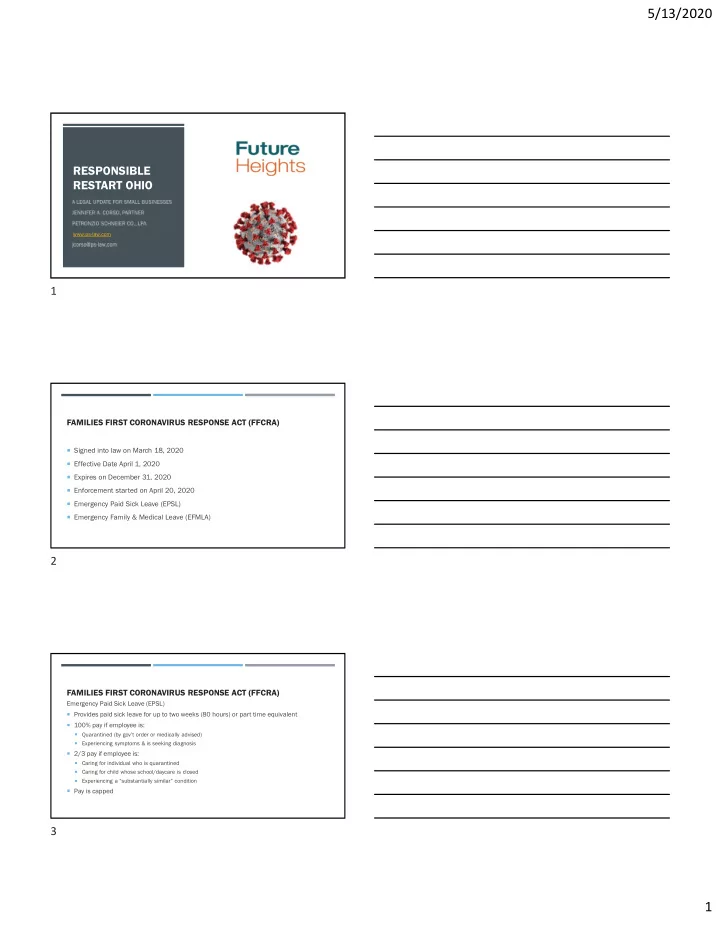

5/13/2020 RESPONSIBLE RESTART OHIO www.ps-law.com 1 FAMILIES FIRST CORONAVIRUS RESPONSE ACT (FFCRA) Signed into law on March 18, 2020 Effective Date April 1, 2020 Expires on December 31, 2020 Enforcement started on April 20, 2020 Emergency Paid Sick Leave (EPSL) Emergency Family & Medical Leave (EFMLA) 2 FAMILIES FIRST CORONAVIRUS RESPONSE ACT (FFCRA) Emergency Paid Sick Leave (EPSL) Provides paid sick leave for up to two weeks (80 hours) or part time equivalent 100% pay if employee is: Quarantined (by gov’t order or medically advised) Experiencing symptoms & is seeking diagnosis 2/3 pay if employee is: Caring for individual who is quarantined Caring for child whose school/daycare is closed Experiencing a “substantially similar” condition Pay is capped 3 1
5/13/2020 FAMILIES FIRST CORONAVIRUS RESPONSE ACT (FFCRA) Emergency Family & Medical Leave (EFMLA) Provides paid sick leave at 2/3 pay for up to ten weeks Only available to care for child whose school/daycare is closed 4 FAMILIES FIRST CORONAVIRUS RESPONSE ACT (FFCRA) EXEMPTIONS Small business exemption – less that 50 employees Only applies to EFMLA, not EPSL Health Care Provider exemption Can apply to both EFMLA and EPSL TAX CREDITS Employers may receive tax credits for both EPSL and EFMLA payments Proper record keeping is essential to receive tax credits 5 FAMILIES FIRST CORONAVIRUS RESPONSE ACT (FFCRA) EMPLOYER RESPONSIBILITIES Post Dept of Labor (DOL) FFCRA Employee Rights poster Employers may receive tax credits for both EPSL and EFMLA payments Proper record keeping is essential to receive tax credits 6 2
5/13/2020 FAMILIES FIRST CORONAVIRUS RESPONSE ACT (FFCRA) EMPLOYER BEST PRACTICES Post supplemental posters re: Small Business and Health Care Provider exemptions Distribute separate EPSL and EFMLA policies, with specific language for SB and HCP exemptions Develop & use request forms for EPSL & EFMLA to request and record all required information to obtain tax credits 7 RESPONSIBLE RESTART OHIO Gradual reopening of some (not all) non-essential businesses: May 1 – healthcare (dental offices, non-essential medical facilities) May 4 – Offices, Manufacturing, Distribution & Construction May 12 – Consumer, Retail & Services May 15 – Salons/Spas/Barbers; Restaurants (outdoor dining only) May 21 – Restaurants – indoor dining 8 RESPONSIBLE RESTART OHIO General Requirements (these differ somewhat with each industry category) Signage re: health safety guidelines Reduce capacity (50% of fire code maximums) Continue work from home where possible Employees must wear mask (unless covered by one of the exceptions) Daily Employee Symptom Assessment 9 3
5/13/2020 RESPONSIBLE RESTART OHIO General Requirements (these differ somewhat with each industry category) Stagger shifts, start times, break times, etc. Social distancing and/or physical barriers for employees Social distance signage Sanitation and Safety protocols (will differ by industry, worksite) 10 RESPONSIBLE RESTART OHIO Best Practice Recommendations Document Employee Symptom Assessments (use individual charts) Work from home/telecommuting policies Return to Work Safety Protocols Review/update regular medical leave of absence policies 11 WORKPLACE SAFETY – CDC, OSHA & STATE LAWS Required Actions Masks for employees Social distancing, physical barriers between employees Regular hand washing & hand sanitizers Cleaning protocols – regular cleaning, deep cleaning, disinfecting Follow all industry specific “Mandatory” requirements 12 4
5/13/2020 WORKPLACE SAFETY – CDC, OSHA & STATE LAWS Best Practice Recommendations Masks for customers/clients Barriers for customers/clients Floor markings, signage to ensure social distancing Follow all industry specific “Recommended Best Practices” 13 WORKPLACE SAFETY – CDC, OSHA & STATE LAWS Required Reporting If employee develops symptoms at work – isolate & seek medical care Contact your local health dept. re: suspected cases and exposures Shutdown workplace for deep cleaning/sanitation, if possible Work with health dept. on contact tracing 14 WORKPLACE SAFETY – CDC, OSHA & STATE LAWS Best Practice Recommendations – Designation & Reporting Designate employee to handle all COVID 19 related absences, including FFCRA time off request and/or layoffs under ODJFS Designate employee responsible for taking temperatures, handling employee assessments, record keeping Designate employee for all contact and required reporting to health dept. Designate employee for all contact tracing & employee notification procedures 15 5
5/13/2020 WORKPLACE SAFETY – CDC, OSHA & STATE LAWS Best Practice Recommendations - Training Train the designated employee! Train employees on new policies Train employees on use of Symptom Assessment Chart Train employees on safety procedures – proper mask usage, handwashing, sanitizing, etc. Document all training, receipt of new policies, etc. 16 RECALLING EMPLOYEES FROM LAYOFF Determine which employee(s) will be called back to work Notify in writing, and give as much time as possible for notice of recall Require response, accepting coming back to work If no response or employee rejects return offer, notify ODJFS 17 RECALLING EMPLOYEES FROM LAYOFF I9 forms – only needed if original I9 is over 3 years old Not needed for furloughed employees Provide employees with any new or revised policies Re-orient employee re: new policies, procedures, PPE, etc. 18 6
5/13/2020 RESOURCES Resource list will be sent out following the presentation. 19 QUESTIONS? 20 7
Recommend
More recommend